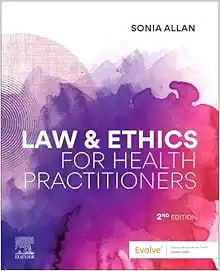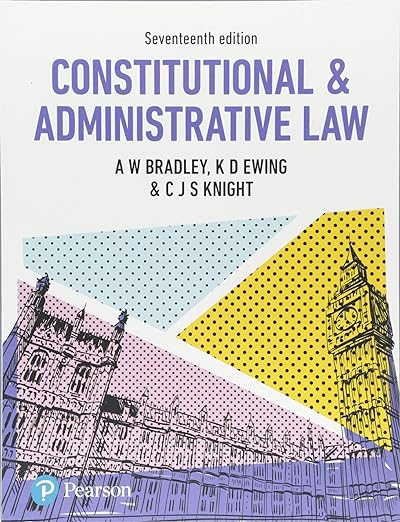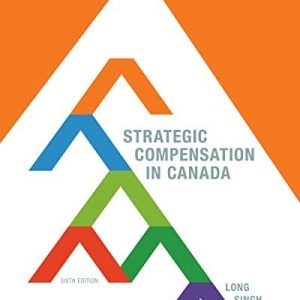Constitutional and Administrative Law 17th Edition
Constitutional and Administrative Law 17th Edition by Anthony W. Bradley (Author), Keith D. Ewing (Contributor), Christopher J.S. Knight (Contributor)
- Publisher : Pearson; 17th New edition (May 25, 2018)
- Language : English
- ISBN-10 : 1292185864
- ISBN-13 : 978-1292185866
- FORMAT: ORIGINAL PDF/PRINT REPLICA
$10
Constitutional and Administrative Law 17th Edition by Anthony W. Bradley (Author), Keith D. Ewing (Contributor), Christopher J.S. Knight (Contributor)
We are living in a decade of political instability in which many of the apparently established
features of the British constitution are under severe strain. The general election in 2010 saw
the return of the irst Coalition government since the Second World War, while nationalist
sentiment led to a referendum on Scottish independence, the result of which could not be
said to have been an overwhelming vote in favour of the Union.
Although the general election of 2015 nevertheless restored a government with a clear
majority, this proved to be only a brief respite from the storms brewing around the Westminster model. These storms have been caused by yet another referendum, one which unlike the
Scottish referendum went against the government, leading to a narrow vote in favour of
Brexit, on a turnout of 72 per cent of those eligible to vote.
The referendum led to the resignation of the Prime Minister and a fresh general election
not long thereafter in which the government increased its popular vote but lost its Commons
majority. After 30 years of single-party governments mostly with clear Commons majorities,
the Coalition thus has been followed by the irst minority government since 1979, relying on
the support of the Democratic Unionist Party, just as Brexit raised diicult questions afecting Northern Ireland.
At the time of writing, the minority British government is negotiating the UK withdrawal
from the European Union, which is due to take efect on 29 March 2019. The process has
already been diicult, with high-proile litigation leading to (i) what was in this country
unprecedented abuse of the judges by sections of the media, and (ii) the strong reassertion of
the principle of parliamentary sovereignty, which the same sections of the media had been
campaigning to promote.
At the centre of these debates was the litigation in R (Miller) v Secretary of State for Exiting the EU [2017] UKSC 5 (in which one of us – CJSK – acted as counsel). That decision has
important implications not only for the discussions of parliamentary sovereignty (Chapter 3),
but also the role of constitutional conventions (Chapter 1) and the control of prerogative
powers (Chapters 1 and 10), as much as it does for the operation of EU law in the United
Kingdom (Chapter 6).
It is quite clear that we are in the early stages of what will be a long Brexit process as the
constitutional and other problems continue to be exposed by intense parliamentary and public scrutiny. The European Union (Withdrawal) Bill, making domestic provision for leaving
the EU and the body of EU law, has raised concerns about the relationship between government and Parliament, the implications of Brexit for devolution, and the loss of the EU Charter of Fundamental Rights.
As we deal with the Bill in a redrafted Chapter 6, the position of a minority government
means it is unwise to assume that its contents will be relected in the inal Act of Parliament.
It will be some time before the dust settles on the referendum of 2016, and subsequent editions
of this book will likely need to respond to the evolving constitutional implications of a changing
landscape, including our continuing relationship with the EU, whatever that may be.
But although Brexit is thus all-consuming, it is important in the meantime not to lose
sight of the other changes that have taken place since 2014, as the United Kingdom’s unique
and dynamic constitution continues gradually to evolve. There have been notable developments on other issues afecting most chapters of this book, whether as a result of legislation or
new jurisprudence, some of which have attracted intense media attention.
Showing 1–12 of 458 resultsSorted by latest
-

Administrative and Clinical Procedures for the Canadian Health Professional Fifth Edition
$17 Add to basket -

Biomedical Ethics A Canadian Focus Third Edition
$13 Add to basket -

Epidemiology Principles Methods And Critical Appraisal Third Edition
$14 Add to basket -

Vaccines Safety Surveillance and Impacts First Edition
$10 Add to basket -

Pocket Guide to Teaching for Clinical Instructors Fourth Edition
$10 Add to basket -

Investing in Health and Wellbeing When Prevention is Better than Cure Second Edition
$10 Add to basket -

Law and Ethics for Health Practitioners Second Edition
$16 Add to basket -

Ciottone’s Disaster Medicine Third Edition
$17 Add to basket -

An Introduction to Management Science: Quantitative Approach Fifteenth Edition
$14 Add to basket -

Board Review in Preventive Medicine and Public Health Second Edition
$10 Add to basket -

Bioethics Passing the Boards Providing Patient Care and Beyond First Edition
$10 Add to basket






